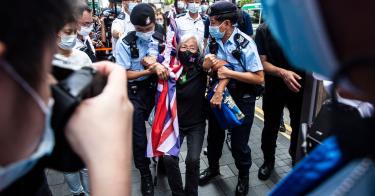More bad news out of Hong Kong: more pro-democracy leaders have been arrested—including, astoundingly, a 90-year-old renowned Catholic cardinal, Joseph Zen.
These arrests, coming on the heels of the recent selection of a new chief executive in the city-state, remind the world that the sea change that began in 2019 is a permanent shift in the state of freedom there.
This latest round of arrests targeted five individuals who were the trustees for the since-disbanded 612 Humanitarian Relief Fund—a fund devoted to providing financial support to pro-democracy protestors facing the ire of the Hong Kong government. Authorities charged all five with “collusion with foreign forces” under the National Security Law (NSL).
The NSL—implemented in June 2020 at the behest of Beijing—ushered in sweeping changes to life as Hong Kongers knew it. Hong Kong’s Legislative Council (LegCo) introduced the new law in response to the massive pro-democracy protests that drew millions of Hong Kongers to the streets. These protestors opposed legislation introduced in the LegCo that would permit extradition of Hong Kongers at Beijing’s bidding.
>>> Why the U.S. Should Extend “Priority 2” Refugee Status to Uyghurs and Hong Kong Citizens
Protestors saw the proposed extradition bill as a threat to their democratic freedoms—proof that Hong Kong’s then-chief executive, Carrie Lam, cared far more about burnishing her credentials with Beijing than with their welfare. Some might say that they saw the writing on the wall.
The NSL has had a chilling effect on civil and political liberties in the city-state. The arrests of renowned pro-democracy leaders like Joshua Wong, Agnes Chow, Ivan Lam, and others came shortly after the law’s implementation. Next was the targeting of pro-democracy business leaders like Jimmy Lai.
Simultaneously, attacks on Hong Kong’s free press and media environment led to the shuttering of Lai’s media empire, typified by Apple Daily. As Hong Kong’s tilt away from good governance solidifies, it reminds us how fragile freedom is.
Far from easing the repression, the new chief executive, John Lee, has promised to extend it by bringing Hong Kong law into conformity with Article 23 of Hong Kong’s constitution, the “Basic Law.” When an attempt was made to do just this in 2003, massive protests shut down the effort. It’s impossible to imagine that sort of outcome in what is now a post “one-country-two-systems” city.
In the wake of 2020, countless Hong Kongers have fled. Tens of thousands have resettled in the United Kingdom, where they enjoy British Nationals Overseas (BNO) status. The Taiwanese government, likewise, offered help to fleeing Hong Kongers. But few others around the globe have stepped up to provide relief.
The U.S. has extended Deferred Enforced Departure (DED) status, which enables Hong Kongers already in the U.S. to stay temporarily. But any form of temporary relief ignores the permanence of changes in Hong Kong. If Beijing has its way—as it already has—Hong Kong will remain under the careful control of the Chinese Communist Party. And freedom-loving Hong Kongers will have no home there.
>>> China’s Ongoing Persecution of Christians and the Case of Pastor Wang Yi
This is why the U.S.—as a global leader in the resettlement of refugees—must step up. Rather than offering temporary relief to individuals like Cardinal Zen, the U.S. Congress and the Biden administration should consider designating Hong Kongers as a group of “special humanitarian concern” and extend Priority-2 refugee status.
Priority-2 refugee status enables applicants to bypass referral from the United Nations High Commissioner for Refugees (UNHCR), a non-governmental organization, or an embassy. This expedites the process for resettlement and keeps the same required vetting processes required for all other refugees seeking resettlement in the U.S. Congress has batted around the possibility of extending this special status to Hong Kongers, but the political will to act has been lacking. The Biden administration could decide to extend such a status at any point in time, but it hasn’t yet.
Cardinal Zen is a renowned Catholic leader in Asia. He has devoted his life to defending human rights and religious freedom in Hong Kong and throughout the region. People like him share a common vision in the cause for freedom—and should find permanent safe haven in the U.S.
This piece originally appeared in Providence Mag



